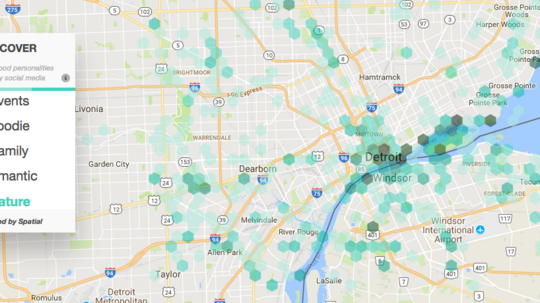
When it comes to digital maps, there are a few ways we mainly use them: to get directions, find a restaurant or figure out the daily train commute. But what services like Google Maps struggle to convey is what a place is really like. Does this part of the city have a romantic vibe? Is that dancehall a hipster jungle? (Asking for a friend.)
Spatial, a Cincinnati-based startup, thinks it can answer those and other questions concerning "sense of place" by looking at what people post on social media. The reason? Through his past experience as an ethnographer, CEO and co-founder Lyden Foust found that social media reveals more about a location than talking to multiple people could.
Here's how Spatial works: the company aggregates data from 30 sources, including social media sites like Twitter and Instagram. It then applies machine learning models to cluster different areas and locations based on certain behaviors and personalities.
"We see there being a massive opportunity in creating this layer of data around the entire world that accurately communicates what's happening."
J. Griffin Morris, Spatial's head of growth, told Cincy Inno this kind of data can help people answer questions that traditional mapping tools can't, such as whether a neighborhood is popular with families or if a certain district has an artsy feel. It can also help city planners and developers understand how the dynamics of a neighborhood change over time.
"We see there being a massive opportunity in creating this layer of data around the entire world that accurately communicates what's happening there so we can help cities plan smarter with that data," Morris said.
While the startup is still early, it has found some traction with companies that want to use Spatial's data for various purposes. Most notably, the company landed a partnership with Ford Motor Company last fall that would bring Spatial's navigation technology to the automaker's cars. The two companies began their relationship when Spatial participated in the 2016 Techstars Mobility startup accelerator in Detroit.
Spatial is also used by companies in real estate and travel to help identify points of interest. "Typically, you can ask a mapping app or GPS-type application to find you a Chinese restaurant or coffee shop," Morris said, "but with our advanced data, you can ask questions like, 'where can I take my wife for a glass of wine that's romantic?'"
Beyond providing mapping tools and neighborhood data, the company is developing a natural language search engine for points of interest. In a demonstration of the search engine, the tool can ask you, for example, if you want to find a place to dance in Cincinnati. It then breaks down each location's unique features, which can include whether it's a big spot for singles to meet, LGBTQ-friendly or a total hipster jungle.
The company raised a $2.1 million seed round led by Serra Ventures last fall.








